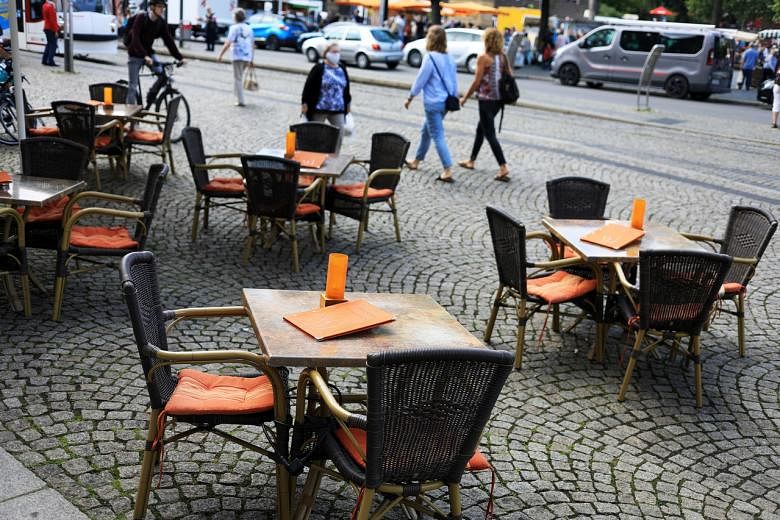BERLIN - A huge poster is mounted above the entrance to the Pescado, a hotel and restaurant in the German spa resort of Graal-Müritz on the Baltic Sea.
It reads: "Loans and deferments are no help. What we need are our guests! Now!"
The huge letters in yellow and red are nothing less than a cry of despair.
With half of the holiday season already gone, Germany's tourism industry is struggling to survive.
"Yes, business is slowly picking up," said Robert, a waiter at the Pescado, while serving the famous local fish. "But how shall we make up for all the losses?", he asks, helplessly.
Only a stone's throw down the road from the restaurant staff of the IFA spa hotel are putting up a brave front as guests fiddle with their respiratory masks before joining a queue to register at the counter.
Marks on the floor indicate the distance they need to keep apart - 1.5 metres. The line is moving slowly and patience is a virtue.
Everywhere there are signs, in blue, of the hotel apologising for the many inconveniences.
Amenities like newspapers, magazines, bottles of water or toiletries have been removed from the rooms because they could spread the coronavirus. The sauna remains closed and the swimming pool reopened only a few days ago.
At the breakfast area, guests again have to queue and quickly rattle off their orders to hotel staff who are standing behind plastic shields while handing out rolls, cheese and eggs.
"I did not come here to stand in line all the time," one guest is heard grumbling. Most of the others, however, are showing solidarity with the staff.
"This is better than nothing," another guest is heard retorting. The others nod.
A few weeks ago it seemed unlikely that hotels would reopen and even travel abroad would be possible by mid-June. Since Monday (June 15), though, Germans can cross borders to visit most of the country's neighbours except Norway, Sweden, Finland and most of Spain where restrictions are still in place.
Due to rigid quarantine requirements, it is also not advisable to travel to the United Kingdom and Ireland.
Germany was in lockdown for roughly ten weeks and the tourism industry was particularly hard hit by the standstill.
Rarely blessed with huge financial reserves, hotel businesses and restaurants quickly ran out of funds - and were putting as much pressure on politicians as possible.
More than once the hotel association, BTW, issued an urgent plea for help: "Our industry has weathered many crises, but now we are facing a crisis of unknown magnitude and we need assistance - fast," said a recent statement on their website.
The group has also criticised the stimulus package of 130 billion euros (S$204.7 billion) announced by the German government earlier this month.
"It contains a few minor positive elements, but is not the great success that was announced. It is doubtful whether the measures will have the desired effect," said BTW.
Even after re-opening, the debt burden on many companies in the tourism sector is rising because of new requirements. Hotels in many German states are allowed to operate at a maximum of 60 per cent of capacity - well below their usual rate of occupancy - for hygiene reasons. At the same time, hotels cannot cut back on staff numbers under new regulations.
Observers are convinced that such a business model is unsustainable and many believe that up to 30 per cent of hotels in Germany could go bankrupt.
"Once a business is shut down it is not coming back," said Thomas Bareiß, Federal Government Commissioner for Tourism and state secretary at the ministry of economics.
A federation of 16 states, Germany is a hodgepodge of rules and regulations. For example, the state of Thuringia has lifted all restrictions regarding meetings but Bavaria still only allows members of two households to assemble.
And while bars in Brandenburg have to stay closed they are already open in Baden-Württemberg.
Even more relaxed is the situation in neighbouring Austria. Hotels there do not require the wearing of a mask or maintaining any social distancing. Buffets are open and so are wellness areas.
This is a catastrophe for Bavaria, which is closest to Austria and is competing for the same customers.
Bavarian hoteliers have to "helplessly follow the caravan of holidaymakers who roll south and east in their cars and check into hotels that are already allowed to open spa and wellness areas again," said Florian Streibl, a leading politician of the independent voters association that is part of the Bavarian government who is a sharp critic of the restrictions still in place in the state.
In the far north of the country, though, tourists cannot easily escape to any other destination.
Most of the bordering Scandinavian countries are either not considered safe or much more expensive.
"We pray that there will be no second wave" a receptionist at the IFA Spa says upon check-out.
"Otherwise it will get real ugly".












